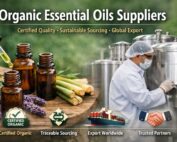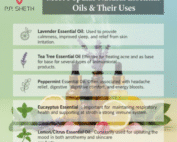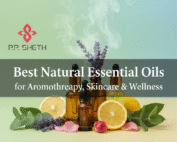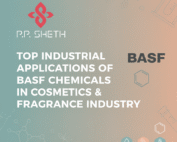We often use the word “perfume” to describe these pleasant scents, but behind each fragrance is a complex blend of raw materials. Whether it’s the soothing scent of your lotion or the fresh aroma of a room spray, these fragrances come from ingredients you may not even know exist.
These varieties of scent products or fragrances are made up of different sources; we frequently confuse the terms essential oils, aroma chemicals and aroma oils. These terms are not interchangeable: knowing the difference between the three is valuable if you are a brand or product developer, or bulk customer in the personal care, aromatherapy, or home care category.
This article will review aroma chemicals and essential oils, their relative benefits, and their role in the fragrance market. Regardless of whether you are looking for raw materials or beginning a new range of products, it is important to realize the difference between these three types of raw materials for fragrance evolution, development and consumption so you can make a more informed and strategic decision.
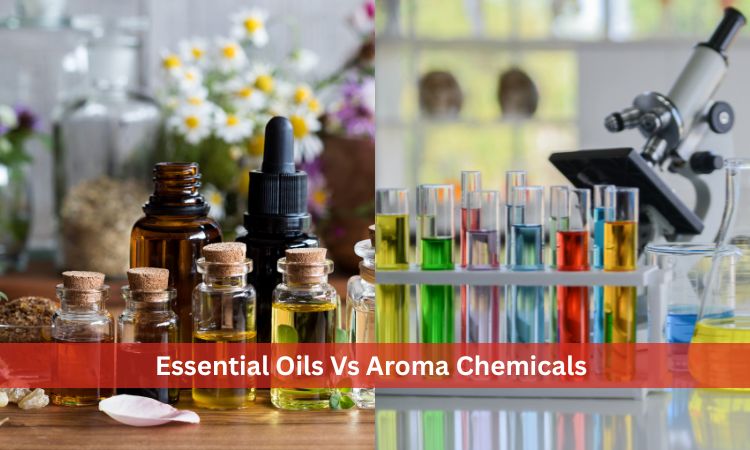
What Are Essential Oils?
One of the most recognized natural fragrance elements is essential oils. They are concentrated plant extracts from a plant’s leaves, flowers, bark, roots, or seeds. The oils capture the scent of the plant and the plant’s functional ingredients.
There are various types of extraction methods, depending on the plant type. Some of the most common methods include:
Steam Distillation – Steam is passed through the material (plant) and carries the aromatic compounds to a condensation/de-carbonisation process and separation.
Cold Pressing – Used for citrus peels – mechanically pressing the oil out of the peel by applying pressure without heating.
Also Read: Essential Oils vs Normal Oils
Essential oils don’t just smell good, they offer a range of benefits, both emotional and functional. Common uses include:
- Aromatherapy: To create relaxing, energizing, or focus-enhancing environments
- Natural Skincare & Cosmetics: For soothing, anti-inflammatory, or antimicrobial properties
- Spa & Wellness: In massage oils, bath salts, calming sprays, and more
- Ayurveda: Trusted in traditional Indian medicine for their therapeutic effects
Some popular examples include:
- Rose oil – Romantic and skin-friendly
- Lemongrass oil – Refreshing and with antibacterial properties
- Peppermint oil – Cooling and energizing
If you are sourcing essential oils in India, our team at PP Sheth offers a range of high-quality options including rose, nutmeg, lemongrass, and peppermint. Each oil is tested for purity, traceable to its source, and available in bulk quantities.
Also Read: Which Essential Oil Plants Are Most Popular?
What are Aroma Chemicals?
Aroma chemicals are single molecules that have a specific odor. Aroma chemicals are different from essential oils in that they are a combination of several different, natural compounds, and aroma chemicals are single compounds that are either taken directly from nature or fabricated synthetically.
Aroma chemicals are typically in two forms:
- Natural-identical – natural-identical ones are lab-made compounds that are chemically identical to those found in nature.
- Synthetic – Compounds that were made. These are not found in nature; they were created for stability, intensity, or cost.
You will find aroma chemicals in:
- Perfume Manufacture – Aroma chemicals allow for the possibility of recreating scents in volume, accurately and repeatedly.
- FMCG Products – Detergents, soaps, deodorants, and air and fabric refreshers often use aroma chemicals as the lasting fragrance in their products.
- Industrial Application – Aroma chemicals can be used to apply fragrance in scale at a consistent level that is also cost-effective.
Also Read: Are Aroma Chemicals Safe?
Here are a few examples of aroma chemicals in use and smell:
- Linalool – A flowery aroma, as in lavender.
- Citral – A lemony aroma as found in lemongrass.
- Vanillin – A sweet smell associated with vanilla, and is an aroma chemical that is usually created synthetically.
If you are seeking an aroma chemicals distributor, PP Sheth offers a wide range of high-purity aroma ingredients in bulk. Our catalog includes both natural-identical and synthetic molecules used in perfumery, home care, and air care products.
Key Differences between Essential Oils vs Aroma Chemicals
To summarize everything, let’s look into a simple comparison between essential oils and aroma chemicals:
|
Feature |
Essential oils |
Aroma Chemicals |
|
Source |
Extracted from plants |
Lab-made or isolated compounds |
|
Complexity |
Blend of many molecules |
Single, isolated molecule |
|
Consistency |
May vary with harvest or climate |
Always consistent in composition |
|
Fragrance Strength |
Subtle, natural |
Strong, sharp, and long-lasting |
|
Cost |
Generally expensive |
More cost-effective for bulk production |
|
Best for |
Natural wellness, skincare, aromatherapy |
Perfumes, industrial, and commercial applications |
Benefits of Essential Oils
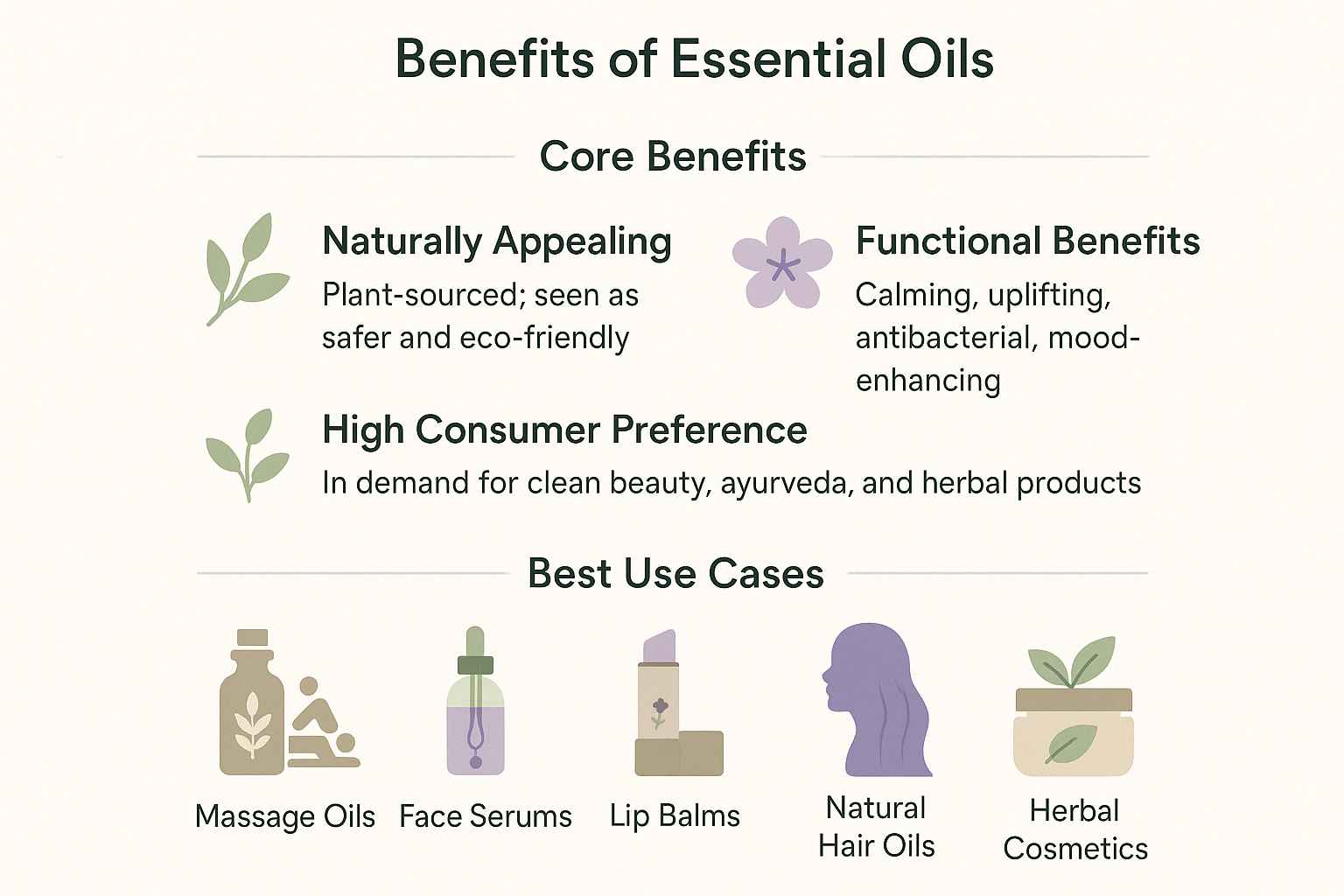
While aroma chemicals offer stability and scalability, essential oils offer nature’s purity and therapeutic touch. Their advantages include:
- Naturally appealing – It is sourced from plant materials. It’s also commonly perceived as safer and more environmentally friendly.
- Functional benefits – Lots of essential oils are calming and uplifting. One also finds them to be antibacterial and general mood enhancers.
- Consumer preference – Essential oils continue as a staple in ayurvedic and herbal formulations. It is basically a demand for clean beauty, and wellness continues to grow.
Best for:
- Massage oils
- Face serums
- Lip balms
- Natural hair oils
- Herbal cosmetics
At PP Sheth, we supply premium quality essential oils such as rose, lemongrass, nutmeg, and peppermint. These have been tested for purity, are completely traceable, and are supplied in bulk for brands and manufacturers wishing to develop nature-inspired products.
Also Read: Simple Ways to Use Essential Oils for a Healthier Lifestyle
Benefits of Aroma Chemicals.
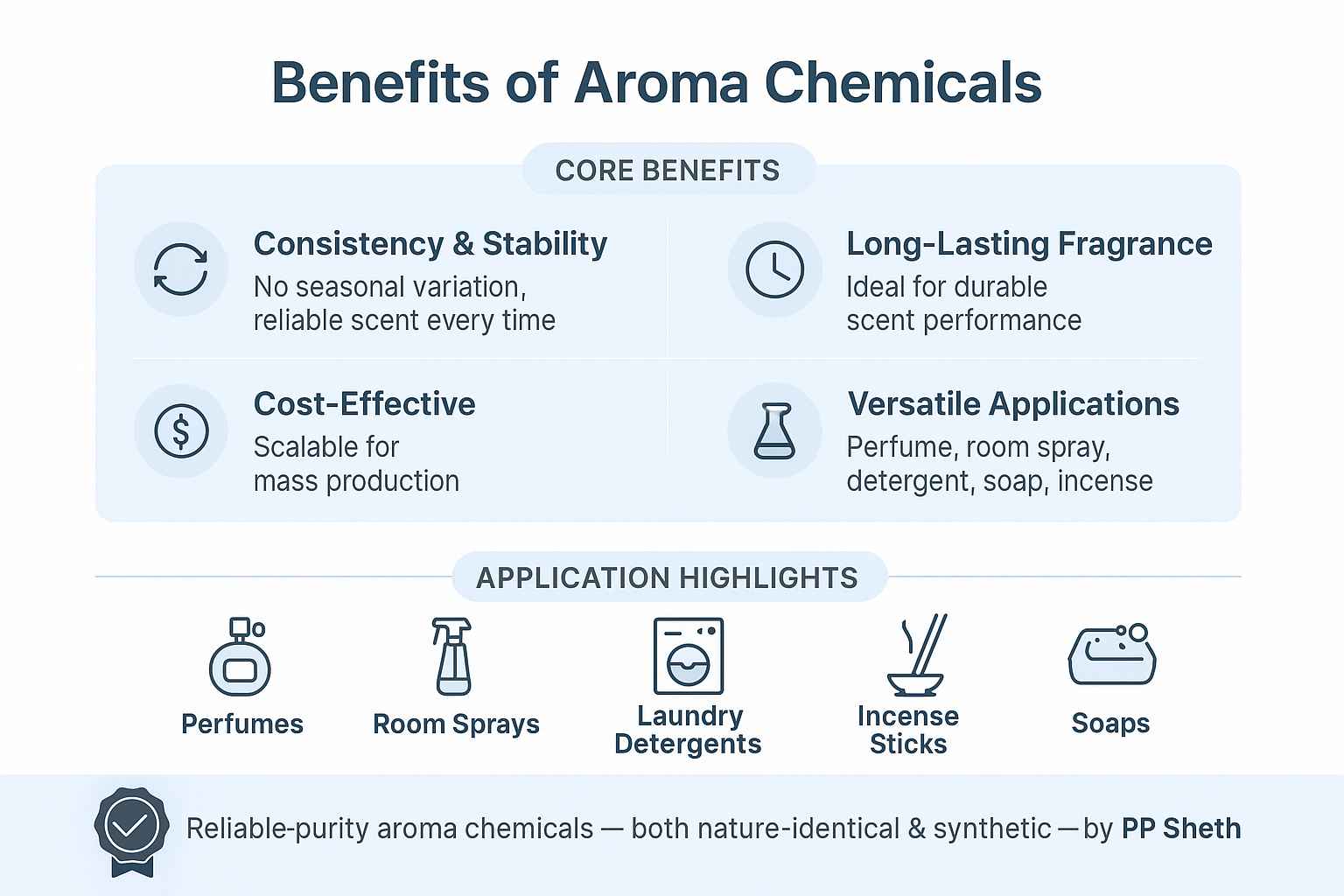
Aroma chemicals are an important part of modern fragrance design and manufacture. Their advantages include:
Consistency and Stability – No seasonal variation means fragrance performance is always reliable.
Cost-Effectiveness – Ideal for businesses that require scalable solutions.
Long-Lasting Fragrance – Great for products that require a lasting scent.
Versatility – Aroma chemicals have a wide range of applications; from perfume to laundry detergent, aroma chemicals are all around us.
As a fragrance ingredient partner, we offer both nature-identical and synthetic aroma chemicals, used in everything from perfumes and room sprays to incense sticks and soaps.
Also Read: How to Identify the Right BASF Aroma Ingredient for Your Product
PP Sheth’s Role – Bulk Supplier of Fragrance Ingredients
PP Sheth has built a strong reputation in the fragrance industry by supplying aromachemicals and essential oils in bulk to reputable brands throughout India and across the globe.
What We Deliver:
-
High-Quality Aroma Chemicals:
We carry both synthetic and nature-identical aroma chemicals sourced from some of the best global manufacturers. As a trusted Aroma Chemicals Manufacturer in India, our ingredients are widely used in perfumery, air care, and FMCG sectors. -
Premium Essential Oils:
Our pure, commercially sourced essential oils are ideal for skincare, wellness, and herbal products. Explore our capabilities as a leading Essential Oil Manufacturer offering scalable, traceable, and therapeutic-quality oils. -
Bulk Supply with Full Documentation:
Every order comes with complete technical documentation, COA, MSDS, and regulatory compliance support to meet your product development needs. -
Flexible Packaging & Delivery:
We offer bulk drum sourcing and custom packaging solutions — bottle shape, size, and labeling are fully negotiable. -
Reliable Global Partnerships:
We collaborate with world-class fragrance innovators like BASF, Isobionics, and others to ensure premium quality and consistent supply.
We take pride in the quality of our product, customer confidence, and having the reputation of being a partner in your product development strategy and not just a supplier.
Conclusion – Picking the right fragrance partner
When considering the essential oils vs aroma chemicals debate, there is no clear-cut answer. Both have their own advantages:
Essential oils provide a natural, wellness-focused experience, combined with the depth and complexity of scent profile.
Aroma chemicals provide strength, specificity, and scale for commercial and industrial applications.
Despite if your brand is focused on natural skincare formulations or mass-market air fresheners, it is always important to select the right fragrance ingredient. That’s where PP Sheth comes in.
Are you looking for support? Do you need to source fragrance ingredients for your next product?
Whether you’re creating a skincare line or developing air fresheners at scale, choosing the right fragrance ingredient is key.
Our team can help you explore the best options, from essential oils to aroma chemicals, based on your product vision.
Contact us to request samples, technical documentation, or pricing for bulk supply.
FAQs
1. What is the main difference between essential oils and aroma chemicals?
Essential oils are natural plant extracts made up of a blend of compounds, while aroma chemicals are single molecules that can be either synthetic or nature-identical, offering consistency and scalability in fragrance applications.
2. Are aroma chemicals safe to use in skincare and perfumes?
Yes, most aroma chemicals used in cosmetics and perfumes are safe when used within regulatory limits set by IFRA and other industry standards. Always ensure you’re sourcing from reputable suppliers.
3. Which is better for product development. essential oils or aroma chemicals?
It depends on your product goals. Essential oils are ideal for natural, wellness-focused products, while aroma chemicals offer better stability, cost-effectiveness, and consistency for large-scale manufacturing.
Also Read: Benefits of Nutmeg Essential Oil
Most Recent Posts

